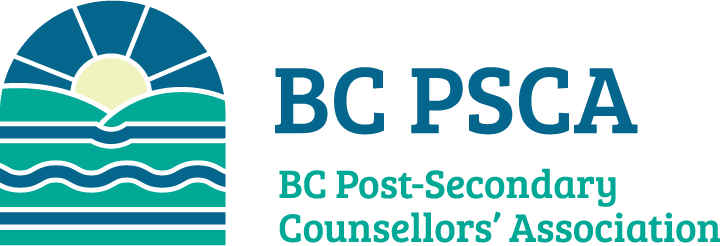BC PSCA Virtual Conference
Home Alone, Together: The Power of PSCA in a Pandemic
May 4, 2021 via Zoom
Join your fellow PSCA members for a one day, virtual conference, featuring trauma specialist Carrie DeJong. Come for learning and connection. Stay for the AGM and the big reveal of this year’s Ode to the PSCA.
This year’s mini-conference is included in your annual PSCA membership, just another one of the benefits of the PSCA. Not yet a member? No problem—we will take the conference fee off your membership.
Registration Closed
“Utilizing Nervous System Regulation Tools to Help Students Thrive”
Carrie DeJong
Tuesday, May 4, 2021
Time 9:25am – 12:00pm
Post-secondary students face increasing challenges that impact their capacity to learn and thrive – the impacts of the global pandemic are acutely affecting them. The rates of anxiety, depression, and addiction disorders have increased. The negative experience of disconnection is disrupting relationships and learning. Every counsellor needs a solid foundation for understanding these issues and tools to support students who seek help. This workshop provides an overview of neurophysiology (brain/body connection) through the lens of Polyvagal Theory. It will offer an exploration of attachment, co-regulation, and emotional regulation. We will also look at The Vortex Model of Addiction – a model based on neurophysiology that provides a foundation for understanding the complexities of mental health challenges, trauma, substance misuse, and addiction disorders.
We will discuss how ongoing challenges impact the nervous system and how unhealthy coping behaviours are utilized to manage the overwhelming activation from anxiety, disconnection, chronic stress, and trauma. The workshop also provides a framework for understanding how various interventions, tools, programs, and resources support students’ personal and academic lives.
Carrie DeJong (MC) is a Registered Clinical Counsellor with over 20 years of experience in the fields of addiction and trauma. She brings greater awareness to the impacts trauma and stress have on overall functioning and behaviours, especially the use of mood-altering substances and behaviours to cope. Her therapeutic approach, as well as the Vortex Model of Addiction she has developed, is rooted in somatic and neurobiological approaches to trauma and addiction. Carrie has utilized the Vortex Model as a framework in providing training to professionals in clinical settings that include mental health, healthcare, and addiction treatment.
8:30-9:00am: Registration and Troubleshooting
9:00-9:15am: Drop In Tea & Coffee in Breakout Rooms
(Chattery Extroverts; For the Introverts; Books; Movies; Random, Quiet Room)
9:15-9:25am: Introduction & Land Acknowledgment
9:25-12:00pm: Carrie DeJong
12:00-1:00pm: Lunch in Breakout Rooms
(Chattery Extroverts; For the Introverts; Books; Movies; Random, Quiet Room)
1:00-1:30-pm: Oral Newsletter 2.0
1:30-3:30pm: AGM (with prizes!) & Ode

